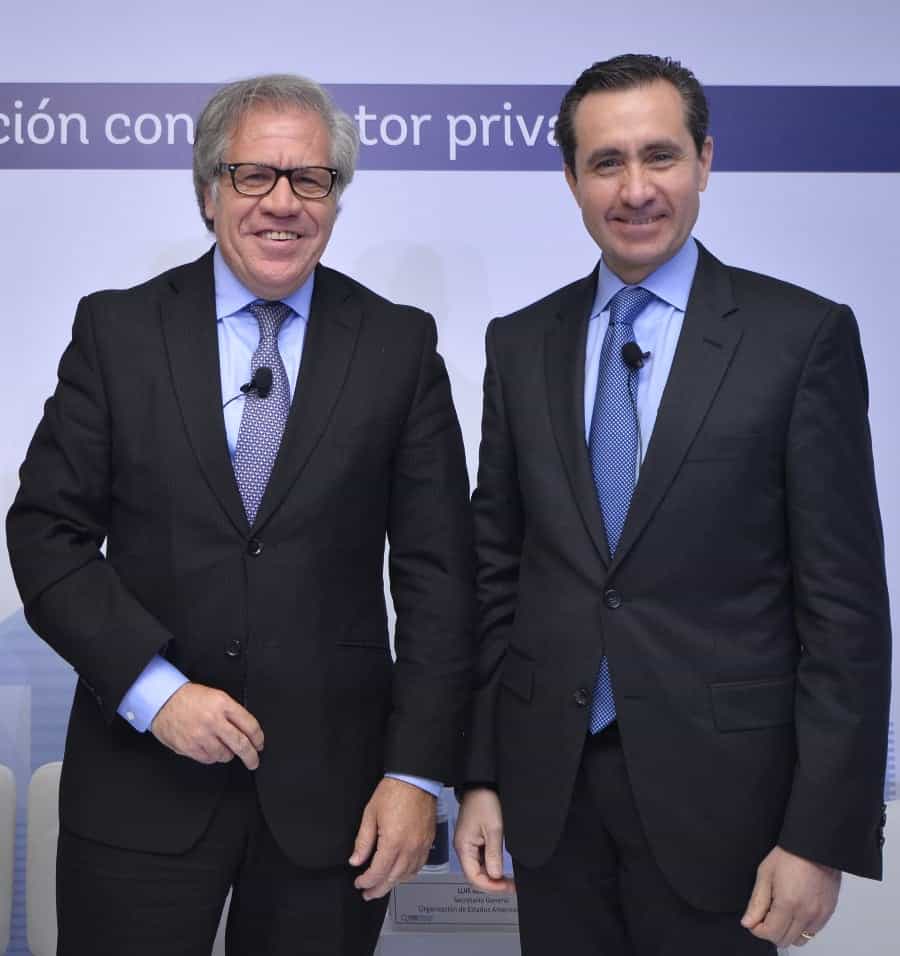
Above: Luis Almagro and Jorge Familiar. Photo courtesy Alexis Fagre/Banco Mundial.
By Luis Almagro and Jorge Familiar
In recent years, we have stressed the importance of fighting corruption at all levels.
Apart from the social injustice it creates, corruption eats away at institutions and has negative consequences for countries’ development.
Each dollar lost to corruption is a dollar taken away from a child deserving an education, a pregnant woman in need of medical attention, or a community with water or infrastructure shortages.
Moreover, corruption drives away private investment, so needed to stimulate economic growth, job creation and poverty reduction. For all these reasons, corruption is an obstacle to development.
Conversely, transparency and accountability are crucial for countries to progress. Transparent government and institutions build trust both among their citizens and investors.
And the same goes for the private sector. Accepting the rules of competitive and regulated systems, without seeking shortcuts outside the system, will be key. Transparency is essential for countries in Latin America and the Caribbean to attract and leverage private investment for development.
This is all the more so at a time when many countries across the region are running fiscal deficits, making it difficult to increase investments in priority areas such as infrastructure, where there is a financing gap of around US$180 billion.
Given this situation, the World Bank Group, the Organization of American States (OAS) and the Panamanian Government, this week jointly launched the Panama Agreement aimed at enhancing transparency, accountability and the fight against corruption in Latin America and the Caribbean.
The agreement includes a series of measures to improve the quality and transparency of fiscal and financial reporting, strengthen accountability in the public sector and enhance cooperation between governments, the private sector and civil society – all key players in the fight against corruption and for countries’ development.
Among the measures proposed is the production of high-quality financial reports from national and sub-national governments, the use of technology tools and platforms for State procurement and public-sector expenses, and the adoption of international open government regulations.
The Agreement also includes measures such as preventing and combating tax evasion, illicit financial flows and money laundering.
Other measures are aimed at promoting open and transparent cooperation between governments and the private sector, as well as strengthening processes to ensure the inclusion of civil society. All of this has a clear goal: to increase the participation of the private sector in financing for development.
The Panama Agreement was presented during the inauguration of the “Cuentas Claras 2018: Government Transparency in Collaboration with the Private Sector” regional conference, jointly organized by the World Bank Group, OAS and the Government of Panama, which took place recently in the capital of that country.
The event brought together representatives from governments, the private sector, academia, regulatory organizations, civil society, international organizations and the media.
As part of this transparency agenda, in recent years reforms have been implemented to reduce government bureaucracy, foster open data and e-government systems, which we support, as well as initiatives aimed at enhancing transparency in national accounts, government budgets and public procurement systems.
The Panama Agreement represents another step toward better governance in Latin America and the Caribbean.
We encourage all governments, the private sector and civil society organizations to join us in this Agreement through their actions, to achieve a more transparent and prosperous region, free from the scourge of corruption, and to create opportunities for progress for all.
Luis Almagro is Secretary General of the OAS. Jorge Familiar is VP of the World Bank for Latin America.


My gut on this is, first, “Another attempt to deal with bureaucracy by adding bureaucracy”. I suppose after decades I’m a skeptic about such things, but I would love to be surprised.